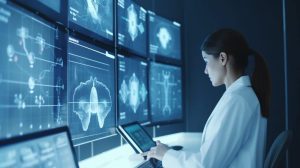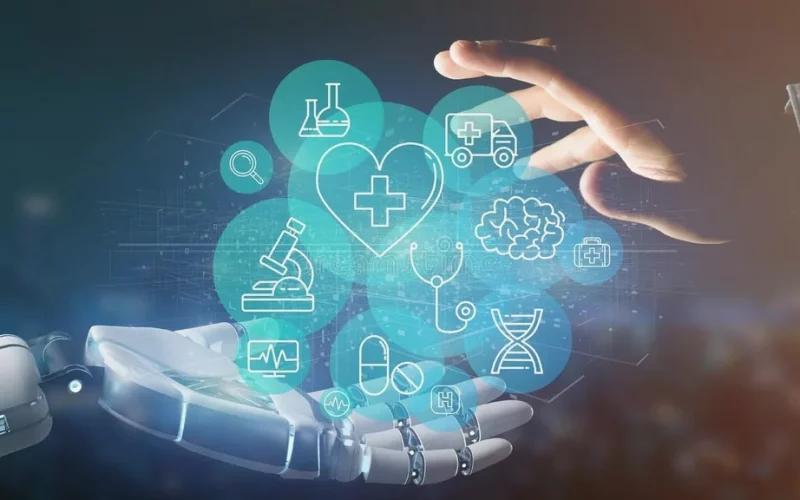The Benefits of AI in Healthcare Diagnostics
Artificial Intelligence (AI) has been one of the most transformative technologies in the healthcare sector in recent years. In the realm of healthcare diagnostics, AI is making a substantial impact by improving the speed, accuracy, and efficiency of diagnosis and treatment. This article explores the various benefits of AI in healthcare diagnostics, highlighting real-world examples, case studies, and the future potential of this technology.
Introduction to AI in Healthcare Diagnostics

AI refers to the simulation of human intelligence in machines designed to think and learn like humans. In healthcare, AI applications have been developed to process and analyze medical data faster and more accurately than humans. AI in healthcare diagnostics uses machine learning, deep learning, and natural language processing to improve clinical workflows, predict diseases, and even support medical professionals in making informed decisions.
AI is not a replacement for doctors but a tool that enhances their diagnostic capabilities. With AI, healthcare providers can catch diseases early, predict health risks, and develop personalized treatment plans tailored to individual needs. The healthcare industry is experiencing a shift towards precision medicine, and AI is at the forefront of driving these changes.
Enhanced Accuracy and Speed in Diagnosing Diseases
One of the key benefits of AI in healthcare diagnostics is its ability to process and analyze large amounts of medical data with remarkable accuracy and speed. AI algorithms can sift through thousands of medical images, lab results, and patient histories, providing insights that may not be immediately apparent to human clinicians.
Example: In 2023, a study published in The Lancet Digital Health demonstrated that AI models outperformed radiologists in diagnosing breast cancer from mammograms. AI models were able to identify early-stage tumors with higher accuracy, significantly reducing false positives and negatives compared to human radiologists.
The ability to analyze imaging data quickly is a game-changer for conditions like cancer, where early detection is critical. AI can detect abnormalities in X-rays, CT scans, and MRIs much faster than human specialists, allowing doctors to make timely decisions.
Improving Clinical Decision-Making
AI is not just about diagnosing diseases; it also helps clinicians make better and faster decisions. With access to a wide range of patient data — including medical history, imaging results, genetic information, and real-time data from wearable devices — AI systems can provide comprehensive insights that inform treatment decisions.
Example: IBM’s Watson Health is an excellent case study of how AI supports decision-making. By analyzing massive amounts of medical literature, clinical trial data, and patient records, Watson helps doctors make evidence-based decisions for complex cases. For instance, Watson has been used in oncology to recommend personalized cancer treatments based on the patient’s genetic makeup.
With AI, healthcare professionals can improve their diagnostic accuracy and offer more personalized treatments. This leads to better patient outcomes, particularly in complex and rare disease cases where expert consultation might be limited.
Real-Time Monitoring and Continuous Care

AI is transforming how healthcare providers monitor patients, particularly those with chronic conditions. Wearable devices and mobile health apps powered by AI can continuously track a patient’s vital signs, including heart rate, blood pressure, glucose levels, and oxygen saturation. This real-time monitoring enables healthcare providers to intervene promptly when issues arise.
Example: AI-powered ECG monitors can detect irregular heartbeats and alert both patients and healthcare providers in real-time, enabling them to take immediate action and potentially preventing life-threatening conditions such as heart attacks or strokes. Similarly, continuous glucose monitoring systems powered by AI can help diabetic patients manage their blood sugar levels more effectively by providing real-time feedback.
These AI tools help bridge the gap between hospital visits, ensuring that patients receive continuous care and attention even when they are at home.
AI in Medical Imaging
Medical imaging is one of the areas where AI has made the most significant advancements. AI algorithms can now analyze medical images, such as X-rays, MRIs, CT scans, and ultrasounds, to detect abnormalities with a level of accuracy that often surpasses human capabilities.
Case Study: Zebra Medical Vision, an AI company, has developed an AI system that analyzes medical imaging data to detect various conditions, including cancers, heart disease, and neurological disorders. In a 2023 clinical trial, Zebra’s AI system demonstrated the ability to identify heart disease in CT scans with 99% accuracy, a result that was comparable to the expertise of radiologists.
AI systems can also prioritize the most urgent cases, helping healthcare providers address the most critical issues first. This ability is particularly useful in busy emergency departments or large hospitals where time is often a crucial factor in patient outcomes.
Reducing the Burden on Healthcare Professionals
Healthcare professionals are under immense pressure to provide accurate diagnoses and care while managing a heavy workload. AI can help reduce this burden by automating routine tasks and assisting in diagnostic processes.
Example: AI-powered tools like chatbots and virtual assistants can help triage patients, gather medical history, and even provide preliminary diagnosis suggestions based on symptoms. This allows healthcare workers to focus on higher-priority tasks and complex cases.
AI can also assist in managing patient data and administrative tasks, reducing paperwork and time spent on non-clinical activities. By streamlining these processes, AI improves the overall efficiency of healthcare delivery and helps prevent clinician burnout.
Conclusion
AI is revolutionizing healthcare diagnostics by improving the accuracy, speed, and efficiency of medical diagnoses. With its ability to detect diseases early, support clinical decision-making, and personalize treatment plans, AI is enhancing patient care and outcomes. Additionally, AI’s potential to reduce healthcare costs, increase access to expert care, and ease the burden on healthcare professionals is paving the way for a more efficient and accessible healthcare system worldwide.
As AI technology continues to evolve, we can expect even more breakthroughs that will further improve the quality of healthcare and make medical diagnoses more accurate and accessible to everyone.
FAQs
1. How does AI improve the accuracy of medical diagnoses?
AI improves diagnostic accuracy by analyzing large datasets quickly and identifying patterns that may be missed by human clinicians.
2. Can AI replace doctors in diagnosing diseases?
No, AI is a tool that supports doctors in making faster and more accurate decisions. It doesn’t replace the need for clinical expertise.
3. What diseases can AI help detect?
AI can help detect a wide range of diseases, including cancer, heart disease, diabetes, neurological disorders, and rare conditions.
4. How does AI help in early disease detection?
AI analyzes medical data and identifies subtle changes that indicate early-stage diseases, even before symptoms appear.
5. What are the cost benefits of using AI in healthcare diagnostics?
AI reduces diagnostic errors, minimizes unnecessary tests, and streamlines administrative tasks, resulting in significant cost savings for healthcare systems.












